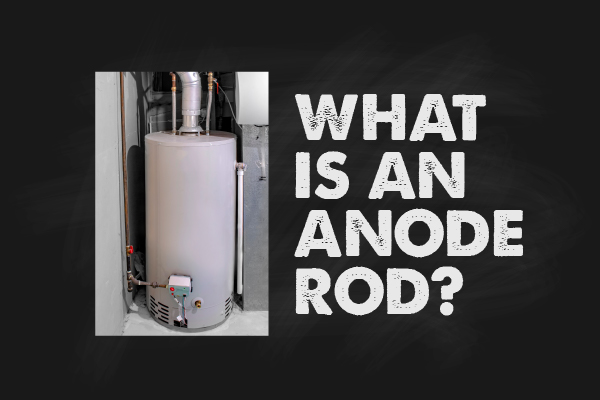
Nearly every house has a water heater. It is one of those appliances you just don’t think much about. Since you don’t have to do anything with it most of the time, you probably only notice it when it isn’t doing its job properly. However, if you maintain it properly, you can get a lot more years of use out of it. Here’s what you need to know about one of the most important parts of your water heater, the anode rod.
What is a Water Heater Anode Rod
A water heater anode rod is a rod located in the tank itself. It has a steel core and is surrounded by aluminum, magnesium, or zinc. It doesn’t matter which material is used because they all serve the same purpose when it comes to protecting the heater the right way. However, the kind of water you have and the area of the country you live in can make some types of anode rod coverings last longer than others.
The purpose of the anode rod is to protect the metal lining of the water heater’s tank to avoid corrosion. It works by attracting any sediment or corrosive materials that are found in the water.
Minerals are a common corrosive material found in water across different places. The minerals and other materials are attracted to the anode rod and corrode it, instead of corroding the inside of the water heater’s tank.
What Is the Anode Rod Made Of?

The anode rod has a core that’s made of steel. Surrounding that core is the material that actually attracts the minerals and other corrosive compounds that can be found in the water. This material is either magnesium, aluminum, or zinc. There are some important reasons why one of these materials might are used, and where you live can affect that.
Magnesium is a common option for the surrounding material that covers the core of an anode rod. It’s made for areas that have soft water. It may not last as long in an area with harder water, and may not be as effective for protecting the lining of the heater in those locations.
Aluminum is the best choice for areas that have a high pH or hard water. It can protect the lining of the water heater in these kinds of locations, making it a good idea if there are a lot of minerals in the water that comes into homes or businesses there.
Zinc has two main areas where it’s used most often. It can be a good replacement for an older anode rod that’s nearing the end of its life, but it also works well for homes that have water smelling of rotten eggs. It can help reduce the smell and will keep the inside lining of the water heater’s tank well-protected, too.
How Often Does the Anode Rod Need to be Maintained?
The life expectancy of an anode rod depends on several factors. To consider how long the rod in your water heater may last, consider the following aspects of your home and hot water usage:
- Whether your home has hard or soft water or water with a high pH
- How hot you keep your water, and how much use the water heater gets
- The age of your water heater
- How well your water heater is being maintained
- What type of anode rod is in your heater
In addition to considering all those factors, it’s also very important for you to flush and drain your water heater once or twice per year. Some people do this more often depending on the water quality and how much the water heater is in use.
When you flush and drain your water heater you help extend the life of the anode rod and also protect the inside of the heater from corrosion. As a general rule, the majority of anode rods later between two and five years. You can get yours checked during the yearly maintenance service for your water heater.
Signs That Your Anode Rod is Going Bad

Since an anode rod won’t last forever, it can be helpful for you to know the signs that it may need to be replaced. Even if it was in good shape at your last yearly maintenance service, it could end up failing before the next annual inspection. Rather than just live with the issues that might cause, you’ll want to get the rod changed out. The main signs that would indicate your anode rod are failing include:
- A smell of rotten eggs
- Discoloration
- An airy sound that comes from your water heater
The airy sound is caused by holes that have formed in the water heater, and are allowing air to get into what would otherwise be a sealed space. The noise this creates is one of the main indications that there is a problem with your heater and that your anode rod is reaching the end of its useful life.
Need to Get Your Anode Rod Replaced or Your Water Heater Maintained?
When it’s time for water heater maintenance or an anode rod replacement, contact the professionals at HEB Plumbing & Sprinkler. We are here to help you maintain your water heater and make sure it stays working properly for the long term. Master Plumber Kathlyn Smith and her team are dedicated to customer service, quality, and value, so you can get the water heater services you need, along with some peace of mind.
